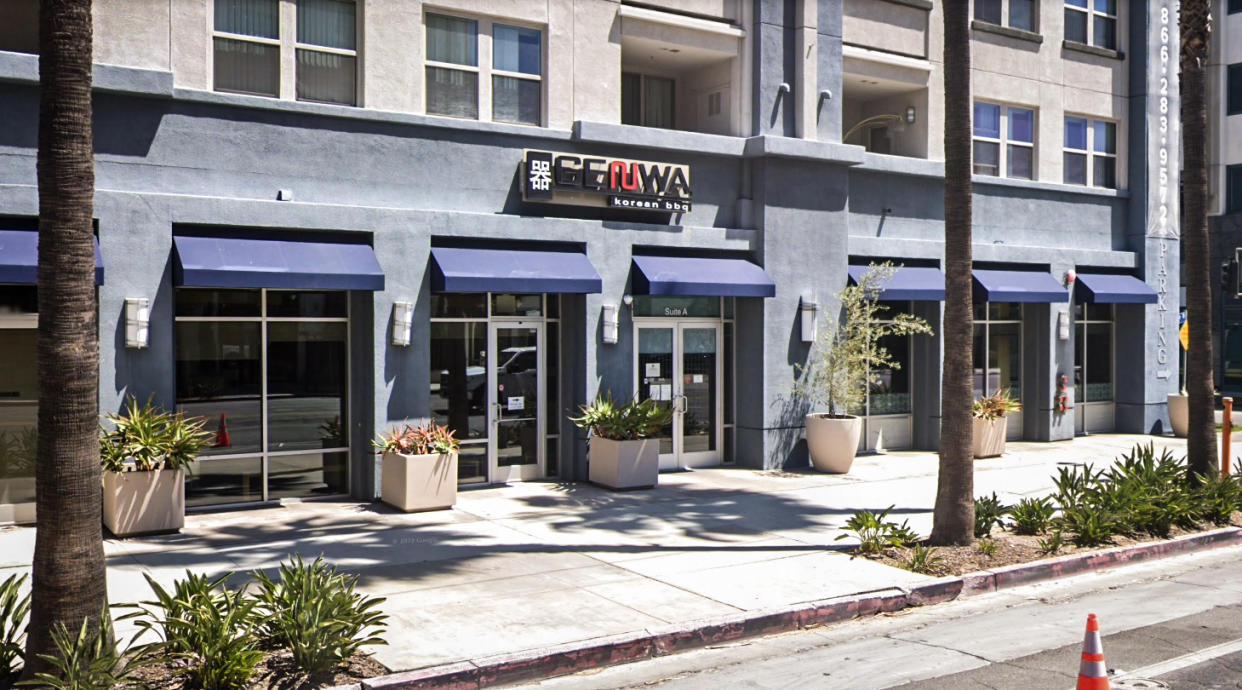What a Korean restaurant worker union win says about future of labor movements
Korean and Latino workers at a Korean restaurant in Los Angeles ratified their first union contract, marking a breakthrough for workers, advocates say.
The win last month makes Genwa, an upscale Korean barbecue chain that’s been cited for multiple labor law violations, the first privately owned Korean restaurant to be unionized nationwide.
Advocates say the historic victory, which came after a half-decade of cross-racial organizing, can provide a blueprint for other immigrant restaurant workers hoping to fight for their rights in an industry rife with exploitation and wage theft.
“Restaurants become a revolving door for servers and bartenders and cooks because there’s no job security,” José Roberto Hernández, president of the union and director of organizing for Koreatown Immigrant Workers Alliance, told NBC Asian America. “We hope the unity between migrant communities, between Asians and Latinos, can bring us to a better future for the workers who are sustaining this industry.”
In the restaurant sector, labor law violations disproportionately harm people of color. A 2010 UCLA survey found that 38% of Latino workers and 36% of foreign-born workers in L.A. experienced wage theft, compared with just 10% of white workers. Workers lose $1.4 billion to wage theft every year, according to an estimate from KIWA.
The new three-year contract at Genwa, which was ratified by 98% of eligible workers, establishes a host of new benefits, including a raise for kitchen staff, seniority rights, sexual harassment training, a retirement plan, a fair tip-distribution system, a streamlined conflict resolution process, reimbursement for health care and the rehiring of workers who were laid off after February 2020. The agreement covers employees at all three of Genwa’s restaurants in L.A.

“We’re one of the biggest food capitals in the country,” Rebecca Nathan, a Korean American former hostess and bartender, said. “How we treat our workers sets an example. How can we justify treating the people that we need so poorly?”In 2017, Hernández said a group of Genwa workers approached KIWA for legal help with allegations of poor working conditions, which Genwa denied. Over the next few years, KIWA helped the workers file claims with the state, unionize and stage a Halloween action at the owner’s house.
Former front-of-house staff, who are mostly Korean, and back-of-house staff, who are mostly Mexican and Central American, joined forces to hold picket lines and committee meetings. Hernandez said the company retaliated by filing lawsuits against himself and other former employees. In an email, Jay B. Kwon, who owns Genwa with his wife, Jin Won Kwon, said the restaurant did not file any lawsuits against Hernandez or any former employee.
Then, in March 2020, the California Labor Commissioner’s Office fined the restaurant $2.1 million for failing to keep proper time records, pay overtime and allow meal breaks — violations “affecting 325 servers, dishwashers and cooks.” Though the pandemic put a halt to the negotiations, the owners finally recognized an independent union, the California Retail and Restaurant Workers Union, in July 2021.
Genwa appealed the decision but ultimately dropped it and settled with the commissioner’s office for a lesser amount, Kwon said.
Nathan, who began organizing with KIWA in 2019, said she hopes the Genwa case leads to a moment of reckoning for the restaurant industry.
“We understood that fighting each other only benefited people who stood to keep our rights from us,” she said. “It was us against the establishment. Hopefully we’ve drawn out some kind of game plan that other people can reference.”
Kwon said he hopes the labor efforts can ultimately serve as an example.
“Although the events leading to the negotiations have been tense, once the negotiation process commenced, both sides demonstrated respect for the other with the understanding that each side was striving to foster quality jobs which would ultimately lead to better standard of service and food, reaching excellence,” he said.
While none of Genwa’s restaurants are located in Koreatown, Hernández hopes the victory inspires cross-racial organizing at other Korean-owned establishments in L.A., many of which he said are known for their poor working conditions and hostility toward unions. He’s currently leading a union drive with workers at the grocery store Hannam Chain.
The unique makeup of ethnic enclaves like Koreatown, which is home to roughly 550 restaurants, makes them a hotbed of workplace abuses, said Connie Chung Joe, chief executive officer of Asian Americans Advancing Justice — Los Angeles.
“It’s a common place for new and less acculturated immigrants to start out,” Joe said. “So the restaurants there really cater to these populations who are poor and less English speaking and who might not know the labor laws of the U.S.”
Like Hernández, Joe said cross-racial organizing is the key to achieving job security and basic rights.
“Koreatown is so unique, being more than 50% Latino but still the cultural hub for the Korean community in L.A.,” Joe said. “I think you’ll see more and more opportunities for bridge-building and more realization that this is how we get things accomplished.”
